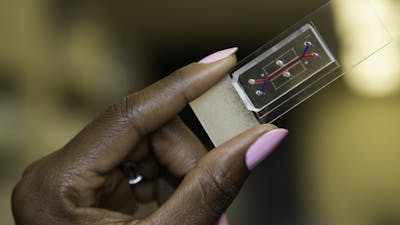Interactions between a woman’s microbiome and the microenvironment of the reproductive tract are crucial for vaginal health. Disruptions of the microbial balance can lead to conditions like HIV, bacterial vaginosis, miscarriage and preterm birth. Yet current research methods, such as microbial cultures and metagenomic analysis, often fail to replicate the cervicovaginal environment accurately.
Our Cervix Chip model mimics the human cervical epithelium-stroma, producing mucus with similar properties to human mucus, and incorporates sensors to monitor barrier function and oxygen levels. By co-culturing with different bacterial communities, the model can replicate healthy and diseased states, providing insights into host-microbiome interactions and potential therapeutic interventions.
